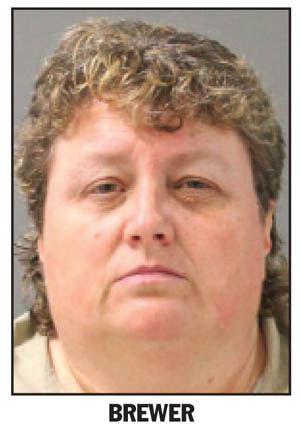Conviction overturned in toddler’s 2014 death
By Jason Evans
Staff Reporter
jevans@thepccourier.com
STATE — The South Caroline Supreme Court has overturned a Pickens woman’s conviction in the 2014 death of her 13-month-old grandson.
 Angela Brewer, 51, was found guilty of homicide by child abuse in the death of her grandson, Brentley Kolbin Lane Lusk, and sentenced to 20 years in prison in 2017. She is currently housed in Columbia at the Graham Correctional Institution, according to online state prison records.
Angela Brewer, 51, was found guilty of homicide by child abuse in the death of her grandson, Brentley Kolbin Lane Lusk, and sentenced to 20 years in prison in 2017. She is currently housed in Columbia at the Graham Correctional Institution, according to online state prison records.
On Oct. 12, the South Carolina Supreme Court released its opinion on her appeal after a February hearing, rejecting one of its issues and upholding the other.
The opinion laid out the facts of the case.
Paramedics arrived at Brewer’s home at 5:30 p.m. on Oct. 17, 2014, after receiving a 911 call about an infant who was not breathing. The child was taken to a hospital, where he was pronounced dead.
From 10:30 a.m.-4:30 p.m. that day, Brewer was the only one in the house with the child and his 1-month-old sister.
Authorities said 911 was called after Brewer could not wake the boy from his nap.
Law enforcement arrived, and Brewer’s husband agreed to a search of the home.
Officers documented a daily pill container and collected two sippy cups, one containing a reddish-colored liquid and the other a yellow-brownish liquid.
Pathologist Dr. James Fulcher performed the autopsy and submitted tissue and blood samples to the National Medical Services (NMS) laboratory because, at that point, he could not determine a cause of death.
On Nov. 6, 2014, Brewer met with a Pickens County detective and rejected his suggestion that the child may have taken her prescription Oxycontin, telling him she kept the medication in her purse at all times.
On Nov. 17, 2014, Fulcher concluded his own report after receiving the NMS report, concluding the baby’s death was caused by “acute oxycodone toxicity.”
SLED testing on the sippy cups said the reddish-brown liquid tested positive for oxycodone and the yellow-brownish liquid tested positive for methamphetamine.
“No report indicated that the child ever tested positive for methamphetamine,” the opinion said.
On Dec. 18, Rita Burgess with the Pickens County Sheriff’s Office and Christine Cauthen of SLED interviewed Brewer after she was read her Miranda rights. Brewer signed a form stating she understood and waived those rights.
Asked if she was under the influence of any medication, Brewer said she’d taken her prescription Oxycontin around 6 a.m. that morning and took Valium shortly before the interview.
Around 45 minutes into the interview, Burgess and Cauthen walked outside with Brewer “to give her a break, because Brewer was slurring her words and struggling to stay awake.”
The interviewed resumed until Brewer requested a lawyer.
“At that point, the investigators ended the interview, sought an arrest warrant and charged Brewer with homicide by child abuse,” the opinion said.
During a pretrial hearing, defense counsel sought to exclude the interrogation video, arguing Brewer was too intoxicated to waive her constitutional rights.
The trial court viewed the video and acknowledged Brewer slurred her words from the outset, but determined she was still capable of giving a voluntary statement, at least initially.
But the court determined the second portion of the video was inadmissible because Brewer’s condition deteriorated to the point where she was too intoxicated to be understood.
Defense also argued Fulcher could not testify regarding the amount of oxycodone found in the child because the only support for that conclusion was the NMS lab report.
“Because the State did not plan to call anyone who actually performed the tests as part of the NMS report, defense counsel argued this violated Brewer’s Sixth Amendment right to confront her witnesses,” the opinion said.
The trial court concluded since the NMS report was not testimonial in nature, the Confrontation Clause was not implicated.
The issues before the Supreme Court were determining whether the court of appeals erred in affirming the circuit court’s admission of Brewer’s statement to law enforcement “despite evidence she was intoxicated” and whether the court of appeals erred in affirming the circuit court’s admission of the NMS report on the grounds that the test results were nontestimonial, Justice Kaye G. Hearn wrote.
“We disagree that the trial court erred in permitting the State to play the first portion of the video,” Hearn wrote. “There is evidence that Brewer, while affected by her medication at the beginning of the interview, sufficiently understood the nature of the questions and was able to answer them.”
Regarding the NMS report, “the State cannot undermine the Confrontation Clause by utilizing a private laboratory in a criminal trial without calling the individual who performed the testing,” Hearn said.
The NMS lab report is testimonial in nature, Hearn wrote.
Brewer should have had an opportunity to cross examine the individual who performed the testing, she wrote.
“We affirm the court of appeals’ conclusion that the trial court did not err in admitting the first portion of the December 2014 interrogation video, but we reverse Brewer’s conviction and sentence because the Confrontation Clause mandates that an individual who actually performed the forensic testing be subject to cross- examination,” Hearn concluded.
The 13th Circuit Solicitor’s Office and State Attorney General’s Office will now have 15 days to file a petition for a rehearing in the case
[/pms-restrict]
Subscribe Today or Login



























